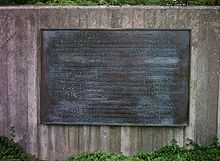|
Neugraben-Fischbek
ⓘ [ˈfɪʃbeːk] is a quarter of Hamburg, Germany, and belongs to the borough Harburg. The quarter consists of the old settlements Neugraben and Fischbek, and the more recently constructed area Neuwiedenthal. History History of FischbekFischbek was first mentioned in 1544 as Vischbecke. In 1937 the independent village Fischbek was merged into Hamburg.[2] History of Neugraben In 1937 the independent village of Neugraben was merged into Hamburg.[2] Subcamp NeugrabenIn Neugraben there was a subcamp of the Nazi concentration camp Neuengamme.[3] On September 13, 1944 the women's subcamp was opened in Falkenbergweg. 500 Czech-Jewish women coming from the Ghetto Theresienstadt were deported to the Auschwitz concentration camp. The SS in Auschwitz selected the women for labour in Hamburg. In the Neugraben camp the work was building auxiliary homes, also laying supply pipes and building streets in the neighbourhood Falkenbergsiedlung. During the last months of World War II, some of the women had to do clearing up work in Harburg's oil industry and to dig antitank obstacles in Hausbruch. In February 1945, the SS transferred the women to the camp Hamburg-Tiefstack and later from there to the Bergen-Belsen concentration camp.[4] GeographyNeugraben-Fischbek is southeast of the quarter Neuenfelde, in the northeast is Francop, in the east is the quarter Hausbruch. In the south is the district Harburg of the German state Lower Saxony. A large part of the quarter is the nature reserve Harburger Berge (Hills of Harburg) in the south. Neugraben-Fischbek it a mixed rural and suburban area of 22.5 km2. In Neugraben-Fischbek is the highest point of Hamburg, the Hasselbrack, which has an elevation of 116.2 metres AMSL[5] DemographicsIn 2006 the Neugraben-Fischbek quarter had a population of 27,103. The population density was 1,204/km2 (3,118/sq mi). 19% were children under the age of 18, and 21.4% were 65 years of age or older. Resident non-Germans comprised 10.1% of the population. 1,644 people were registered as unemployed.[6] In 1999 there were 12,170 households, out of which 27.9% had children under the age of 18 living with them and 30.5% of all households were made up of individuals. The average household size was 2.31.[7] Population by year[6]
InfrastructureTransportationNeugraben-Fischbek is served by the rapid transit system of the city train with the stations Neugraben and Fischbek.[8] See alsoNotes
References
Parts translated from de:Neugraben-Fischbek External linksWikimedia Commons has media related to Hamburg-Neugraben-Fischbek.
|
||||||||||||||||||||||||||||||||||||||||||||||||||||||||||||||||||||||||||||


